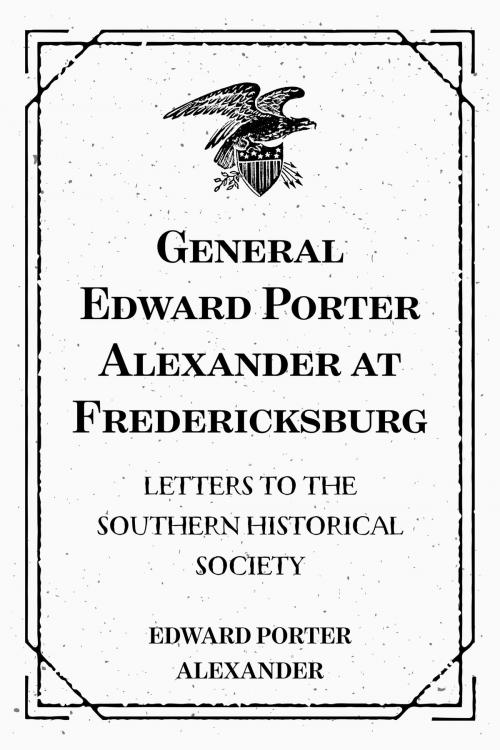General Edward Porter Alexander at Fredericksburg: Letters to the Southern Historical Society
Nonfiction, History, Americas, United States, Civil War Period (1850-1877), 19th Century, Biography & Memoir| Author: | Edward Porter Alexander | ISBN: | 9781518310904 |
| Publisher: | Krill Press | Publication: | November 25, 2015 |
| Imprint: | Krill Press | Language: | English |
| Author: | Edward Porter Alexander |
| ISBN: | 9781518310904 |
| Publisher: | Krill Press |
| Publication: | November 25, 2015 |
| Imprint: | Krill Press |
| Language: | English |
In the narrative of the Civil War, Edward Porter Alexander has loomed larger in death than in life. Just 25 years old when the war broke out, Porter Alexander had already served as an engineer and officer in the U.S. Army, but the native Georgian resigned his commission in May 1861 and joined the Confederacy after his home state seceded.
Porter Alexander would continue to serve under Longstreet's corps for most of the rest of the war, and he famously suggested to Lee at Appomattox that the Confederate army should disband and melt away instead of surrender. Porter Alexander would later regret the suggestion, and Lee scolded him for it anyway.
Though he had served with distinction during the Civil War, it was Porter Alexander's memoirs that have kept his name alive today. While many prominent officers on both sides wrote memoirs, Porter Alexander's were among the most insightful and often considered by historians as the most evenhanded. With a sense of humor and a good narrative, Porter Alexander skillfully narrated the war, his service, and what he considered the successes and faults of others, including Lee, when he thought they had made good decisions or mistakes. As a result, historians continue to rely heavily on his memoirs as a source for Civil War history.
Before he even wrote his memoirs, he wrote letters that were published in the Southern Historical Society, which kept a literary journal that helped develop the “Lost Cause” and became the clearinghouse for many Confederate writers after the war. In this letter, Porter Alexander narrates his account of the Battle of Petersburg.
In the narrative of the Civil War, Edward Porter Alexander has loomed larger in death than in life. Just 25 years old when the war broke out, Porter Alexander had already served as an engineer and officer in the U.S. Army, but the native Georgian resigned his commission in May 1861 and joined the Confederacy after his home state seceded.
Porter Alexander would continue to serve under Longstreet's corps for most of the rest of the war, and he famously suggested to Lee at Appomattox that the Confederate army should disband and melt away instead of surrender. Porter Alexander would later regret the suggestion, and Lee scolded him for it anyway.
Though he had served with distinction during the Civil War, it was Porter Alexander's memoirs that have kept his name alive today. While many prominent officers on both sides wrote memoirs, Porter Alexander's were among the most insightful and often considered by historians as the most evenhanded. With a sense of humor and a good narrative, Porter Alexander skillfully narrated the war, his service, and what he considered the successes and faults of others, including Lee, when he thought they had made good decisions or mistakes. As a result, historians continue to rely heavily on his memoirs as a source for Civil War history.
Before he even wrote his memoirs, he wrote letters that were published in the Southern Historical Society, which kept a literary journal that helped develop the “Lost Cause” and became the clearinghouse for many Confederate writers after the war. In this letter, Porter Alexander narrates his account of the Battle of Petersburg.















